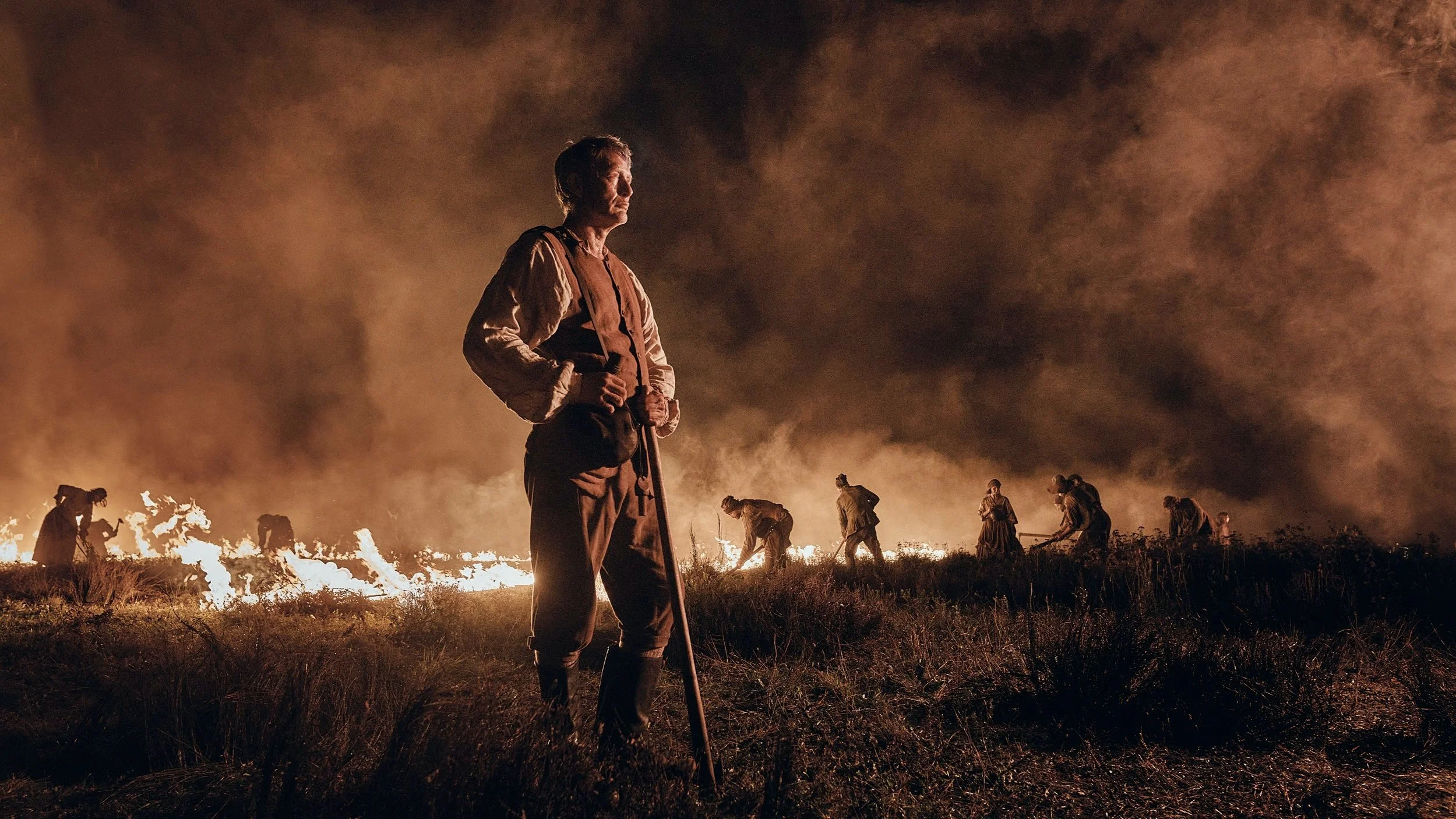The Promised Land
Mads Mikkelsen stars in a well-mounted historical drama set in 18th-century Denmark.
Mads Mikkelsen
The Danish filmmaker Nikolaj Arcel may be better known in his own country than he is internationally but nevertheless in 2013 his period drama A Royal Affair was Oscar-nominated as best foreign language film after having won two Silver Bear awards at Berlin the year before. Based on a novel but dealing with real- life events in the second half of the 18th century, that film, splendidly photographed and with fine production values, certainly confirmed that Arcel was at home in such a work. While his other films are very different in character, this new piece could be considered a calculated attempt to repeat the success of that earlier one. The Promised Land is again an adaptation of a novel set in the 18th century albeit taking place a decade or so earlier and it too is a work that draws on history. Mads Mikkelsen, who starred in A Royal Affair, is also the lead actor here and we have the same photographer as before, the admirable Rasmus Videbæk. Indeed, the four countries who produced A Royal Affair are all on board here too and this film has followed that one in being put forward as Denmark’s latest Oscar contender although this time it failed to make the final cut.
Mikkelsen's role is that of Ludvig von Kahlen who lived from 1700 to 1774. When the film opens it is 1755 and, despite a successful army career which has led to his becoming a Captain, we encounter him as an inhabitant of a poorhouse for veterans in Copenhagen. However, he has ambitions and this former gardener’s boy whose mother had been raped by her master approaches the Royal Treasury with a proposal. He wishes to be allowed to cultivate the uninviting soil of Jutland believing that if he brings in potatoes from Germany they will grow there. The king, Frederik V, is keen on having the heath developed so approval is forthcoming – and all the more readily because those who authorise it are simply going along with the king’s whim while expecting anyone who takes on the project to find that it will end in failure.
Against that factual background, The Promised Land develops a story of strong popular appeal. Ludvig’s attempts to make the land productive reflect his strength and ambition but also show him as a little man challenging those who look down on him. In particular the film features another actual person, the local landowner and magistrate Frederik De Schenkel (Simon Bennebjerg). However, justly or not he is shown here as the worst of men making false claims to the land given to Ludvig, frequently raping his servants and torturing any tenant farmers who seek to flee. Relishing this role, Bennebjerg portrays him as the villain we love to hate.
Another layer is added to the drama with the audience encouraged to speculate over what will happen when the story introduces two female characters who, contrasted as they are, could in each case possibly win the love of Ludvig. First, there's Edel (Kristine Kujath Thorp) who is De Schenkel’s cousin and his intended bride. That is not a fate that she would welcome and it is apparent that she admires Ludvig when she sees him refusing to relinquish his claim to the land. Then we have Ann Barbara (Amanda Collin) who becomes Ludvig’s housekeeper after De Schenkel has through torture brought about the death of her husband (Morten Hee Andersen) who had been in his service. When an abandoned Romani named Anmai (the able child player Melina Hagberg) is encountered, Ludvig under Ann Barbara’s influence virtually adopts her. This adds yet another thread to the rich storytelling with the treatment of Anmai, dismissed by some as a darkling who brings bad luck, linking effectively with issues of colour that resonate today.
If A Royal Affair dealt with matters that left me wishing that the screenplay had been given greater depth, The Promised Land works better in that it opts to tell its story in such a way that serious social matters are given force but in the context of a film that sets out to be a dramatic entertainment. That side of the film would appear to be exemplified by the fact that, despite the piece having a degree of historical accuracy, the character of Ann Barbara is, or so I am told, an invention. In a well-acted film, she certainly has a key role to play since what ultimately shapes the film is the dramatic arc present in the film’s portrait of Ludvig as an understandably embittered man driven by ambition to succeed but eventually discovering other values in life.
In theory it might seem a good thing that at 127 minutes The Promised Land is some ten minutes shorter than A Royal Affair. But, unexpectedly, its later scenes, including a big dramatic climax that is reminiscent of Puccini’s Tosca, let it down. Some of the plotting here just seems to lack credibility, but over and above that the final minutes seem rushed. That's a pity since much of the time The Promised Land is a well-mounted and effective commercial work offering drama that should please a mass audience.
Original title: Bastarden.
MANSEL STIMPSON
Cast: Mads Mikkelsen, Amanda Collin, Simon Bennebjerg, Gustav Lindh, Thomas W. Gabrielsson, Kristine Kujath Thorp, Melina Hagberg, Magnus Knepper, Olaf Højgaard, Morten Hee Andersen, Jacob Lohmann.
Dir Nikolaj Arcel, Pro Louise Vesth, Screenplay Anders Thomas Jensen and Nikolaj Arcel, based on the book The Captain and Ann Barbara by Ida Jessen, Ph Rasmus Videbæk, Pro Des Jette Lehmann, Ed Olivier Bugge Coutté, Music Dan Romer, Costumes Kicki Ilander.
Zentropa Entertainments/Film i Väst/Zentropa International Berlin/Zentropa International Sweden-Icon.
127 mins. Denmark/Germany/Sweden/Czech Republic 2023. US Rel: 2 February 2024. UK Rel: 16 February 2024. Cert. 15.


